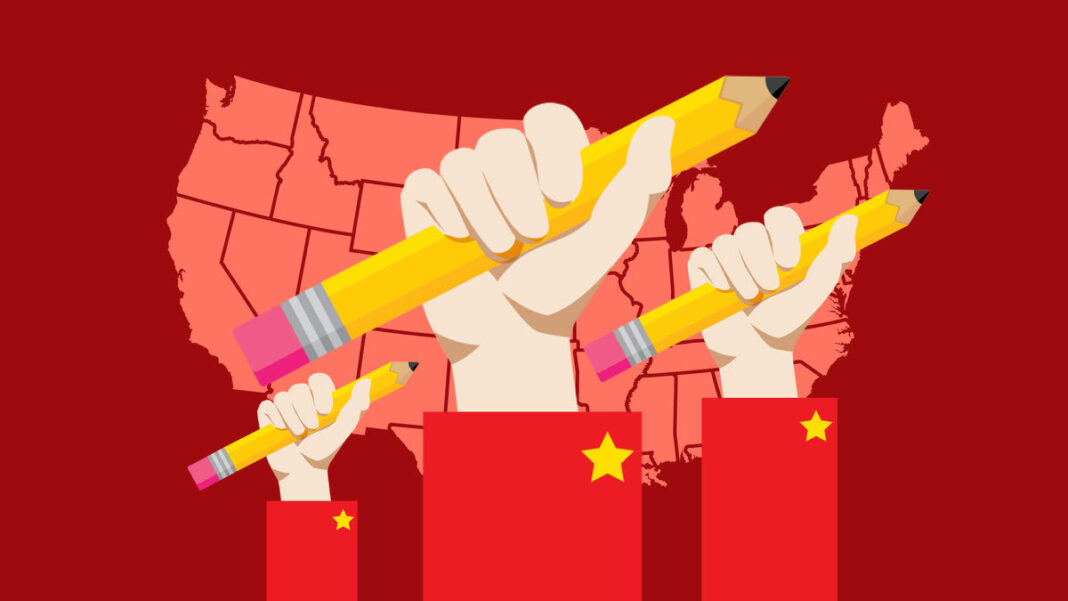The world watched in admiration, and even awe, as university students in China risked the full wrath of the Chinese Communist Party (CCP) and protested for an end to the CCP regime’s draconian “zero COVID” policy. Chinese students living overseas heartily encouraged the protests back home—but the threat to Chinese students in the West who wish to debate the issues affecting their country and propose alternatives to the current political system is already large and growing.
If Chinese students who continue to come to the U.S. to study were to face the kind of intimidation their brothers and sisters back home already endure, it would be a shameful betrayal of everything universities profess to stand for.
From its creation, the freedom to engage and debate ideas has been fundamental to the university; even the church-sponsored institutions in the first few centuries left academics free to debate all manner of controversial ideas, even if they conflicted with church beliefs. This dedication to free inquiry grew in importance after the scientific revolution, when the freedom to debate contending hypotheses became critical.
Since the 1960s, Western universities have continuously debated all manner of contentious social issues. Such activities have frequently contributed to valuable change in American society. But these universities now face an increasing threat to this fundamental principle from representatives of the most totalitarian force in the world—the CCP.
Since taking unchallenged power in 1949, the CCP has brooked no perceived threat to its power. Alas, it now seeks to export its campaign to deny Chinese citizens their freedom well beyond China’s borders, including in Western universities. It demands Chinese who are part of Western campus communities to either proclaim fealty to the CCP or to stay as silent as they would back home.
It is helped in this venture by some Chinese students and scholars who, motivated by the mistaken belief that to love the CCP is the same as to love China, seek through their studies to strengthen China’s international power. Any threat to CCP power is seen by these people, who communicate with and are occasionally members themselves of the Chinese security apparatus, as something that must be suppressed, whatever quaint devotion foreign universities may have to the free exchange of ideas.
“If Chinese students who continue to come to the U.S. to study were to face the kind of intimidation their brothers and sisters back home already endure, it would be a shameful betrayal of everything universities profess to stand for.”
A key (though not the exclusive) vehicle for this attempt to deny the right of Chinese members of Western campus communities to debate the future of their country is the Chinese Student and Scholars Association (CSSA—a CCP entity. Affiliates of this organization began to be established at Western universities in the early 1980s, as Chinese students began to be permitted by the CCP for the first time since 1949 to study at such schools.
Wherever Chinese students can be found abroad in significant numbers there will be a CSSA chapter. And these chapters routinely attempt to prevent speakers, demonstrations, and activism against Chinese government policy, notably those that advocate for human rights in Tibet, Xinjiang, and Hong Kong. Indeed, some affiliates have been decertified at a few universities for such behavior.
Even more sinisterly, the CCP directly pays its unique variety of special attention to those Chinese who speak, protest or organize against it on Western campuses.
Frequently, parents of such students are contacted by someone working with China’s vast state security apparatus and threatened with severe consequences if their children do not cease such activism.
Similar to the recent revelations about Chinese government “police stations” found throughout cities in North America and Europe, as well as the CCP’s monitoring of social media to silence Chinese critics overseas, the CCP increasingly feels at perfect liberty to export its nightmarish model of the social contract to the free countries of the West—heedless of Western respect for fundamental human rights.
From France to Mexico to Taiwan to the U.S., universities have long been havens for students and faculty to debate ideas that make some uncomfortable. And over the past few decades, some schools have become more reliant on the tuition income generated from Chinese students. But university leaders need to acknowledge the unacceptable risk to those brave Chinese students on American campuses who dare to stand up for the idea that China deserves a better future than the one the corrupt, brutal, yet domestically omnipotent CCP imposes on them and their families
American universities should reflect their best traditions, first by publicly announcing (as former Gov. Mitch Daniels did in 2021, when he was president of Purdue University) that no harassment of or threats against anyone for criticizing the Chinese (or any) government will be tolerated. (This position earned Daniels a writeup in the CCP’s leading English-language propaganda organ as an agent of the party’s favorite bête noire, the dreaded “color revolution.”) In addition, they should continue to eagerly welcome Chinese nationals into their institutions, whether as faculty or students, while insisting that our traditions of free thought will be respected.
This is what it means to truly value freedom of speech, inquiry, and debate. If Chinese students can’t be free from CCP tyranny while attending Western universities, it is a failure of the academic institutions, and a betrayal of the students.
thedailybeast.com

